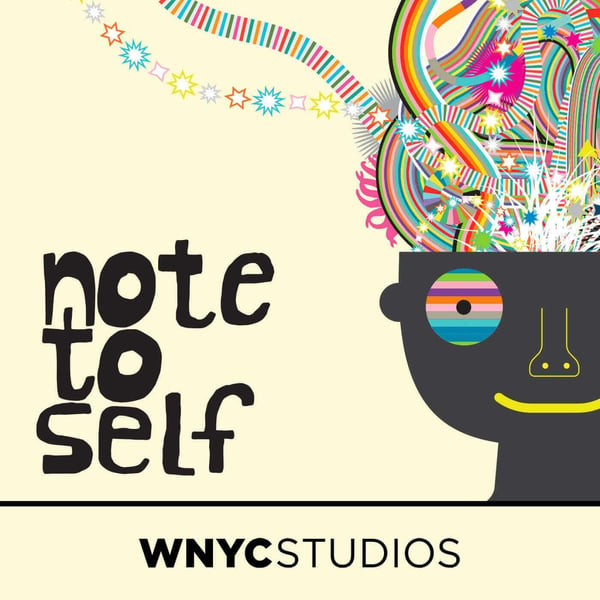Screens Really are a Nightmare for Sleep
Note to Self
WNYC Studios
4.7 • 2.7K Ratings
🗓️ 24 December 2014
⏱️ 13 minutes
🧾️ Download transcript
Summary
May we suggest a holiday activity for the family?
Sleep. Without screens. Get a lot of it.
New research from the Proceedings of the National Academy of Sciences finds that that bluish-glow from computers, smart phones and tablets is, in fact, keeping us up at night, and the impacts are worse than scientists previously suspected. Not only are our devices keeping us up later and later into the evenings, they're actually making it more difficult for us to fall asleep at all. The consequences are psychological and biological.
So no, this isn't an excuse to push the kids away on Christmas morning. It's more of a long-term lifestyle plea, culled from a ton of data WNYC collected earlier this year. And in that spirit, we're re-airing one of our favorite episodes from 2014, about something we do every day (or at least we try to do). Getting enough rest to stave off some pretty staggering screen-fueled sleep deficits.
Give it a listen (or another, if you caught it earlier this year), and join us in getting some much-needed rest this winter.
Subscribe to the podcast on iTunes, or on Stitcher, TuneIn, I Heart Radio, or anywhere else using our RSS feed.
Transcript
Click on a timestamp to play from that location
| 0:00.0 | Hello friend, this is an episode of Note to Self, but from when we used to be called New Tech City. |
| 0:07.0 | Same good content, just the old name. Enjoy. |
| 0:16.0 | From WNYC, this is New Tech City, where digital gets personal. I'm Anouche Summerodi. |
| 0:22.0 | One of my absolute favorite episodes this year, the one that really most changed my behavior, was the one about sleep. |
| 0:37.0 | And how technology has messed with sleep through the ages. This show really made me think, huh, well maybe the reason I haven't been sleeping well for a while is because I'm constantly looking at screens. |
| 0:49.0 | And I'm going to tell you some of the changes that I made in a minute. But first, let's go way back. |
| 0:55.0 | To before we had electricity or gas lighting, back then we slept differently. Maybe you've heard the term before, it's byphasic sleep. |
| 1:05.0 | After toiling in the fields, we'd rest at sundown, seduced by the natural dark, then three or four hours later we'd wake up. Maybe just lie there in the dark and chill out. |
| 1:17.0 | Or have a snuggle with someone, sing a song around the fire. Then it was back to bed, more sleep. |
| 1:24.0 | This is natural sleep. But once we could turn on lamps in our homes, our streets, the day's got longer. |
| 1:34.0 | We didn't lie down with the sunset, we started staying up later. We started consolidating our sleep into what we do today, a six to eight hour stretch on a good night. |
| 1:44.0 | And here comes the fascinating part. Not only did we use to sleep in segments, but being awake then felt different. Call it pre-tech consciousness. |
| 1:57.0 | A psychiatrist and researcher at the National Institute of Mental Health named Thomas Ware proved this recently. It's really interesting how he did it. |
| 2:07.0 | I did an experiment where I had healthy people go into a dark room for 14 hours every night for at least a month in some cases for three months. |
| 2:19.0 | Initially, Dr. Ware was trying to measure melatonin levels. That's that hormone in our bodies that regulates our daily biological clock. |
| 2:27.0 | But I realized that actually no one had ever done an experiment like this. No one had ever really looked to see how humans respond to changes in day length. |
| 2:36.0 | So I thought I should really measure everything I could manage to measure. And that included sleep. And the sleep findings were actually some of the most surprising and interesting ones. |
| 2:47.0 | Segmented sleep, the way people used to sleep before the gaslight invaded our homes, came back. In the dark, nature crept back in. |
| 2:57.0 | They would typically lie awake for a couple of hours and then suddenly fall asleep, maybe sleep 3, 4, 5 hours, and then wake up for an hour or two, and then go back to sleep and sleep another 3, 4, 5 hours. |
| 3:13.0 | Maybe for a total of 8 and a half hours. So I tend to think of this as a kind of, let's say, natural human sleep or sort of default human sleep. |
| 3:23.0 | Where watched and tracked and watched and tracked these regular people drifting off night after night in his special sleep box. |
| 3:31.0 | And it almost seemed like they were reaching a higher state of mind. |
... |
Please login to see the full transcript.
Disclaimer: The podcast and artwork embedded on this page are from WNYC Studios, and are the property of its owner and not affiliated with or endorsed by Tapesearch.
Generated transcripts are the property of WNYC Studios and are distributed freely under the Fair Use doctrine. Transcripts generated by Tapesearch are not guaranteed to be accurate.
Copyright © Tapesearch 2025.

